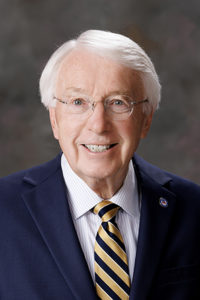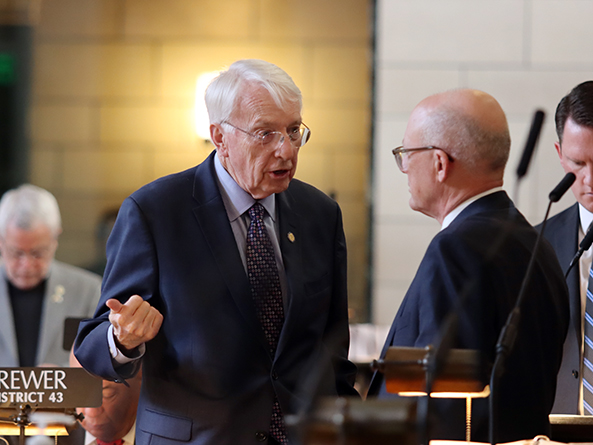Shortened unemployment eligibility discussed
Senators began first-round debate March 5 on a proposal that would reduce the maximum number of weeks a person could receive unemployment benefits in Nebraska under the Employment Security Act.

LB1170, introduced by Ralston Sen. Merv Riepe, would reduce the maximum amount of unemployment benefits a person is eligible for from 26 weeks to 16 weeks. The bill also would proportionally reduce the maximum benefit payable when a disqualification — such as voluntarily leaving work, misconduct or rejecting suitable employment — is assessed.
The bill would maintain a current benefit clause that allows unemployment benefits to be extended in the case of an economic emergency. The provisions of LB1170 would take effect Jan. 1, 2025.
Riepe said the federal Bureau of Labor Statistics reports that there are 2.5 available jobs for every unemployed person in Nebraska. Unemployment benefits play a vital role in society, he said, but they also may inadvertently discourage individuals from actively seeking employment.
“We have to ask ourselves at what point does it stop becoming a safety net and … start becoming a disincentive for participating in society,” Riepe said. “While it’s important to support Nebraskans in finding work that aligns with their experience and provides fair compensation, it’s also critical to recognize that at a certain point individuals may need to accept available work opportunities.”
Proponents of the measure said the state’s low unemployment rate and abundance of available jobs indicates that a reduction in unemployment benefits is necessary to sustain Nebraska’s workforce.
Seward Sen. Jana Hughes said offering displaced Nebraskans 26 weeks of unemployment benefits made sense during the pandemic and other times of economic upheaval, but is counterproductive when the state’s current unemployment rate is 2.3%.
“LB1170 is a commonsense approach to dealing with reality,” Hughes said. “Keeping unemployment benefits at six months only serves to make our workforce issues unnecessarily worse.”
Sen. Mike Jacobson of North Platte agreed, saying he can’t walk two blocks without seeing a help wanted sign.
“You shouldn’t have to take six months to find a job,” Jacobson said. “You shouldn’t need six weeks to find a job, frankly.”
Speaking in opposition, Omaha Sen. Machaela Cavanaugh argued that forcing Nebraskans into jobs that aren’t a good fit is not the best way to create a robust workforce. She offered a series of unsuccessful motions to extend debate on the proposal.
“We jeopardize the ability of parents and families to get good jobs because they’re going to have to take [any] job or have zero income whatsoever,” Cavanaugh said.
Lincoln Sen. George Dungan also opposed the measure. Children and families living in poverty should not be punished to prevent the potential misuse of the state’s unemployment system, he said. Dungan also noted that only 18% of Nebraska unemployment claimants in 2022 continued to receive benefits beyond the proposed 16 weeks according to the state Department of Labor.
“We’re not talking about people who abuse the system, we’re talking about hardworking Nebraskans,” Dungan said. “When you’re struggling with the day-to-day realities of poverty, it is very, very difficult to pull yourself up by your own boot straps if you don’t have the boot straps in the first place.”
Also speaking in opposition to LB1170, Sen. Tony Vargas of Omaha said there is no evidence that a reduction in the maximum possible weeks of eligibility results in lower unemployment rates.
After approximately four hours of debate, the Legislature adjourned for the day before voting on the bill’s advancement. LB1170 remains on general file.


